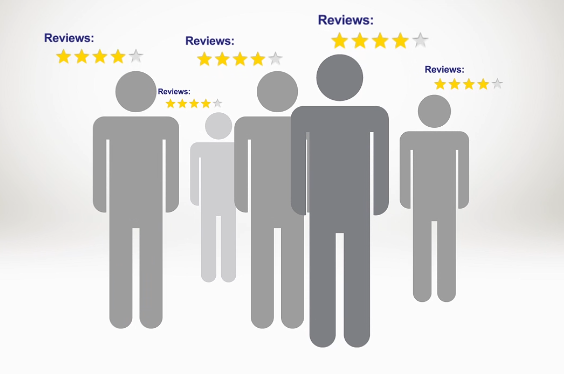
Understanding what is libel or defamation and what is protected speech.
Your medical spa, plastic surgery practice, or professional reputation are are open to criticism and 'reveiws' online. Here's what you need to know about what's protected free speech, and what might cross the line into Libel.
Here are some links about these kinds of CyberSlapp suits and where the law comes down on free speech and other issues around this:
Chilling Effects Clearinghouse: A joint project of the Electronic Frontier Foundation and Harvard, Stanford, Berkeley, University of San Francisco, University of Maine, George Washington School of Law, and Santa Clara University School of Law clinics.
Defamation: The law of defamation balances two important, and sometimes competing, rights: the right to engage in free speech and the right to be free from untrue attacks on reputation. In practice, the filing or even the threat to file a lawsuit for defamation has sometimes been used as a tool to shut down legitimate comment and free speech on the Internet.
John Doe Anonymity: Do you post to a public message boards or discussion areas on websites such as Yahoo, AOL or Raging Bull? Do you use a pseudonym, fake name or a "handle"? Has someone asked the host of the discussion or your ISP to turn over information about you or your identity? If so, then the John Doe/Anonymity section may answer some of your questions.
Protest, Parody and Criticism Sites: The Internet, which offers inexpensive access to a worldwide audience, provides an unparalleled opportunity for individuals to criticize, protest and parody.
The following is long but you'll come away with a much better understanding of what this all means and what speech is protected in the U.S.
Need to protect your reputation? Check out Frontdesk's Reputation Protection for Physicians
Online Defamation FAQ
Question: What are the elements of a defamation claim?
Answer: The party making a defamation claim (plaintiff) must ordinarily prove all four elements:
- a publication to one other than the person defamed;
- a false statement of fact;
- that is understood as
a. being of and concerning the plaintif; and
b. tending to harm the reputation of the plaintiff.
- If the plaintiff is a public figure, he or she must also prove actual malice.
Question: What defenses may be available to someone who is sued for defamation?
Answer: There are ordinarily 6 possible defenses available to a defendant who is sued for libel (published defamatory communication.)
1. Truth. This is a complete defense, but may be difficult to prove.
2. Fair comment on a matter of public interest. This defense applies to "opinion" only, as compared to a statement of fact. The defendant usually needs to prove that the opinion is honestly held and the comments were not motivated by actual "malice." ( Malice means knowledge of falsity or reckless disregard for the truth of falsity of the defamatory statement.)
3. Privilege. The privilege may be absolute or qualified. Privilege generally exists where the speaker or writer has a duty to communicate to a specific person or persons on a given occasion. In some cases the privilege is qualified and may be lost if the publication is unnecessarily wide or made with malice.
4. Consent. This is rarely available, as plaintiffs will not ordinarily agree to the publication of statements that they find offensive.
5. Innocent dissemination. In some cases a party who has no knowledge of the content of a defamatory statement may use this defense. For example, a mailman who delivers a sealed envelope containing a defamatory statement, is not legally liable for any damages that come about from the statement.
6. Plaintiff's poor reputation. Defendant can mitigate (lessen) damages for a defamatory statement by proving that the plaintiff did not have a good reputation to begin with. Defendant ordinarily can prove plaintiff's poor reputation by calling witnesses with knowledge of the plaintiff's prior reputation relating to the defamatory content.
Question: Can an opinion be defamatory?
Answer: No — but merely labeling a statement as your "opinion" does not make it so. Courts look at whether a reasonable reader or listener could understand the statement as asserting a statement of verifiable fact. (A verifiable fact is one capable of being proven true or false.) This is determined in light of the context of the statement. A few courts have said that statements made in the context of an Internet bulletin board or chat room are highly likely to be opinions or hyperbole, but they do look at the remark in context to see if it's likely to be seen as a true, even if controversial, opinion rather than an assertion of fact dressed up as an opinion.
Question: Is there a difference between reporting on public and private figures?
Answer: Yes. A private figure claiming defamation — your neighbor, your roommate, the guy who walks his dog by your favorite coffee shop — only has to prove you acted negligently, which is to say that a "reasonable person" would not have published the defamatory statement.
A public figure must show "actual malice" — that you published with either knowledge of falsity or in reckless disregard for the truth. This is a difficult standard for a plaintiff to meet and especially if you're running a business that engages in any marketing or advertising that effectively makes your business 'public'.
Question: Who is a public figure?
Answer: A public figure is someone who has actively sought, in a given matter of public interest, to influence the resolution of the matter. In addition to the obvious public figures — a government employee, a senator, a presidential candidate — someone may be a limited-purpose public figure. A limited-purpose public figure is one who (a) voluntarily participates in a discussion about a public controversy, and (b) has access to the media to get his or her own view across. One can also be an involuntary limited-purpose public figure — for example, an air traffic controller on duty at time of fatal crash was held to be an involuntary, limited-purpose public figure, due to his role in a major public occurrence.
Examples of public figures:
- An attorney for a corporation organized to recall members of city counsel
- A psychologist who conducted "nude marathon" group therapy
- A land developer seeking public approval for housing near a toxic chemical plant
- Members of an activist group who spoke with reporters at public events
- Your medical spa or clinic...
Corporations are not always public figures. They are judged by the same standards as individuals.
Question: May someone other than the person who originally made the defamatory statement be legally liable in defamation?
Answer: One who "publishes" a defamatory statement may be liable. However, 47 U.S.C. sec. 230 says that online service providers are not publishers of content posted by their users. Section 230 gives most ISPs and message board hosts the discretion to keep postings or delete them, whichever they prefer, in response to claims by others that a posting is defamatory or libelous. Most ISPs and message board hosts also post terms of service that give them the right to delete or not delete messages as they see fit and such terms have generally been held to be enforceable under law.
Question: Can an ISP or the host of the message board or chat room be held liable for
defamatory of libelous statements made by others on the message board?
Answer: No. Not in the United States.
Under 47 U.S.C. sec. 230(c)(1) (CDA Sec. 230): "No provider or user of an interactive computer service shall be treated as the publisher or speaker of any information provided by another information content provider." This provision has been uniformly interpreted by the Courts to provide complete protection against defamation or libel claims made against an ISP, message board, blog comments or cummunity forums where the statements are made by third parties. Note that this immunity does not extend to claims made under intellectual property laws.
Question: Must an ISP or message board host delete postings that someone tells him/her are defamatory? Can the ISP or message board delete postings in response to a request from a third party?
Answer: 47 U.S.C. sec. 230 gives most ISPs and message board hosts the discretion to keep postings or delete them, whichever they prefer, in response to claims by others that a posting is defamatory or libelous. Most ISPs and message board hosts also post terms of service that give them the right to delete or not delete messages as they see fit and such terms have generally been held to be enforceable under law.
CyberSLAPP & John Doe Lawsuits
Question: How is Internet anonymity affected by John Doe lawsuits?
Answer: Often called "CyberSLAPP" suits, these lawsuits typically involve a person who has posted anonymous criticisms of a corporation or public figure on the Internet. The target of the criticism then files a lawsuit so they can issue a subpoena to the Web site or Internet Service Provider (ISP) involved and thereby discover the identity of their anonymous critic. The concern is that this discovery of their identity will intimidate or silence online speakers even though they were engaging in protected expression under the First Amendment.
Question: Why is anonymous speech important?
Answer: There are a wide variety of reasons why people choose to speak anonymously. Many use anonymity to make criticisms that are difficult to state openly - to their boss, for example, or the principal of their children's school. The Internet has become a place where persons who might otherwise be stigmatized or embarrassed can gather and share information and support - victims of violence, cancer patients, AIDS sufferers, child abuse and spousal abuse survivors, for example. They use newsgroups, Web sites, chat rooms, message boards, and other services to share sensitive and personal information anonymously without fear of embarrassment or harm. Some police departments run phone services that allow anonymous reporting of crimes; it is only a matter of time before such services are available on the Internet. Anonymity also allows "whistleblowers" reporting on government or company abuses to bring important safety issues to light without fear of stigma or retaliation. And human rights workers and citizens of repressive regimes around the world who want to share information or just tell their stories frequently depend on staying anonymous – sometimes for their very lives.
Question: Is anonymous speech a right?
Answer: Yes. Anonymous speech is presumptively protected by the First Amendment to the Constitution. Anonymous pamphleteering played an important role for the Founding Fathers, including James Madison, Alexander Hamilton, and John Jay, whose Federalist Papers were first published anonymously.
And the Supreme Court has consistently backed up that tradition. The key U.S. Supreme Court case is McIntyre v. Ohio Elections Commission. http://www.eff.org/Legal/Cases/mcintyre_v_ohio.decision
Question: What are the typical claims behind a CyberSLAPP suit?
Answer: The most common complaints by CyberSLAPP plaintiffs are defamation, trademark or copyright infringement, and breach of contract. Speech that involves a public figure - such as your medical spa or practice - is only defamatory if it is false and said with "actual malice." It also must be promoted as being factual rather than an expression of opinion. In the US, because of our strong free speech protections, it is almost impossible to prove defamation against a public figure.
Trademark and copyright complaints typically claim that defendants have violated intellectual property rights by using the name of a corporation or its products, or by quoting from some of their copyrighted materials such as an annual report. In reality, the First Amendment includes a clear right to criticize and discuss corporations and their products, and the law includes clear exceptions for the "fair use" of protected material for those purposes.
Breach of contract suits often involve a claim that anonymous speakers might be employees who have violated a contract by releasing confidential information. Of course, the right to anonymous speech is meaningless if a corporation can unmask your identity at will because you might be an employee breaking a promise of confidentiality.

Question: What other resources are available?
Answer: Web sites dealing with this issue include:
www.aclu.org,
www.citizen.org,
www.johndoes.org,
www.casp.net,
www.cybersecuritieslaw.com,
cyber.findlaw.com/expression/censorship.html
Question: What are the key federal decisions involving anonymous speech?
Answer: 1. Buckley v. American Constitutional Law Foundation (1999) 525 U.S. 182, 197-200;
2. McIntyre v. Ohio Elections Commission (1995) 514 U.S. 334. In that case, on page 357, the Supreme Court said:
"[A]n author is generally free to decide whether or not to disclose his or her true identity. The decision in favor of anonymity may be motivated by fear of economic or official retaliation, by concern about social ostracism, or merely by a desire to preserve as much of one’s privacy as possible. Whatever the motivation may be, . . . the interest in having anonymous works enter the marketplace of ideas unquestionably outweighs any public interest in requiring disclosure as a condition of entry. Accordingly, an author’s decision to remain anonymous, like other decisions concerning omissions or additions to the content Amendment.
* * *
Under our Constitution, anonymous pamphleteering is not a pernicious, fraudulent practice, but an honorable tradition of advocacy and dissent.
3. Talley v. California (1960) 362 U.S. 60. (holding unconstitutional a state ordinance prohibiting the distribution of anonymous handbills)
4. Lamont v. Postmaster General (1965) 381 U.S. 301, 307 (finding unconstitutional a requirement that recipients of Communist literature notify the post office that they wish to receive it, thereby losing their anonymity);
5. ACLU of Georgia v. Miller (N.D. Ga. 1997) 977 F. Supp. 1228 (striking down a Georgia statute that would have made it a crime for Internet users to “falsely identify” themselves online).
Question: Aren’t people required to explain why they’re subpoenaing my identity and other information?
Answer: Not with the initial request. The reasons for the subpena are only provided if the subpena is challenged, through a motion to quash. In opposing the motion to quash, the person seeking the information must demonstrate, at a minimum, that it is likely to lead to the discovery of information that would be useful in a lawsuit.
Question: I signed a confidentiality/privacy agreement with my ISP that provides that they will not release my information. Doesn’t that protect me?
Answer: No. Most privacy agreements state that information will be turned over in response to legal requests, and a subpena is such a request. Even if the agreement does not say so, a legally issued subpoena overrides such agreements as a matter of public policy. Each ISP has a different policy about notifying users when their information has been subpoenaed, but they cannot simply ignore a subpoena under the law without risking legal santion themselves.
Question: What does "respond" to the subpena mean?
Answer: Usually, it means that the ISP will give the requested information to the requesting person. In some cases, ISPs have resisted requests for information on behalf of their customers, but this is not the norm. Unless specifically told differently by your ISP, you should assume that your ISP will turn over your information as part of its response.
Question: Can an ISP or the host of the message board or chat room be held liable for defamatory of libelous statements made by others on the message board?
Answer: No. Under 47 U.S.C. sec. 230(c)(1): "No provider or user of an interactive computer service shall be treated as the publisher or speaker of any information provided by another information content provider." This provision has been uniformly interpreted by the Courts to provide complete protection
against defamation or libel claims made against an ISP, message board or chat room where the statements are made by third parties. Note that this immunity does not extend to claims made under intellectual property laws.
Question: Can my ISP or the host of a message board be held liable for defamatory statements I make on the grounds that they are a "publisher" or "republisher" of the information?
Answer: No. Federal law provides: "No provider or user of an interactive computer service shall be treated as the publisher or speaker of any information provided by another information content provider." This has been interpreted to protect hosts of discussions between other people against defamation and libel claims as a "republisher" of the information. Note that this protection does not extend to claims under intellectual property laws.
Question: Must an ISP or message board host delete postings that someone tells him/her are defamatory? Can the ISP or message board delete postings in response to a request from a third party?
Answer: 47 U.S.C. sec. 230 gives most ISPs and message board hosts the discretion to keep postings or delete them, whichever they prefer, in response to claims by others that a posting is defamatory or libelous. Most ISPs and message board hosts also post terms of service that give them the right to delete or not delete messages as they see fit and such terms have generally been held to be enforceable under law.
Question: My ISP tells me it's been asked to turn over my name as part of a lawsuit against hundreds of "John Does" in a faraway state. What can I do?
Answer: You should probably contact a lawyer, and suggest that the lawyer take a look at arguments raised by the EFF, ACLU, and Public Citizen in one of these suits (e.g.,http://www.eff.org/IP/P2P/RIAA_v_ThePeople/JohnDoe/20040202_UMG_Amicus_Memo.pdf)
Need to protect your reputation? Check out Frontdesk's Reputation Protection for Physicians






















